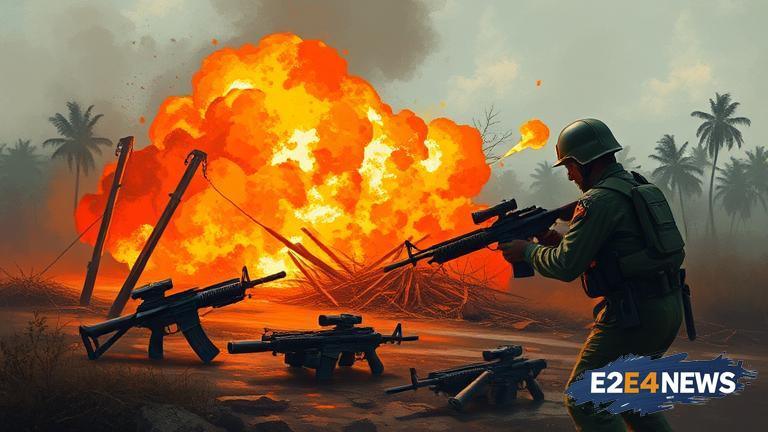The border conflict between Thailand and Cambodia has intensified, despite claims of a ceasefire by former US President Donald Trump. The two nations have been engaged in a longstanding dispute over a stretch of land along their shared border, with both sides exchanging fire and blaming each other for the violence. The clashes have resulted in the deaths of several soldiers and civilians, and have displaced thousands of people. The conflict began in 2008, when Cambodia submitted a proposal to the UNESCO World Heritage Committee to list the ancient temple of Preah Vihear as a World Heritage site. Thailand opposed the move, claiming that the temple was located on disputed territory. The situation escalated in 2011, when Thai and Cambodian troops clashed near the temple, resulting in the deaths of several soldiers. The conflict has continued to simmer, with periodic outbreaks of violence. In recent days, the clashes have intensified, with both sides exchanging artillery fire and blaming each other for the violence. The Cambodian government has accused Thailand of launching a series of unprovoked attacks, while the Thai government has claimed that Cambodian troops have been firing into Thai territory. The conflict has drawn international attention, with the United Nations and other organizations calling for a ceasefire and a peaceful resolution to the dispute. Despite the calls for peace, the violence has continued, with both sides dug in and refusing to back down. The conflict has had a significant impact on the local population, with thousands of people displaced and many more affected by the violence. The economic impact of the conflict has also been significant, with trade and tourism between the two nations severely disrupted. The Thai government has imposed a curfew in the affected areas, and has deployed additional troops to the border. The Cambodian government has also deployed troops to the border, and has accused Thailand of attempting to provoke a wider conflict. The international community has called for a peaceful resolution to the dispute, and has offered to mediate talks between the two nations. However, so far, there has been little progress towards a resolution, and the conflict continues to simmer. The situation remains volatile, with the potential for further violence and escalation. The conflict has also had a significant impact on the region, with other nations in Southeast Asia watching the situation closely. The Association of Southeast Asian Nations (ASEAN) has called for a peaceful resolution to the dispute, and has offered to provide support and assistance to both nations. The European Union has also called for a ceasefire, and has offered to provide humanitarian assistance to those affected by the conflict. The United States has also weighed in on the conflict, with the State Department calling for a peaceful resolution and offering to provide support and assistance to both nations. Despite the international pressure, the conflict continues to escalate, with both sides refusing to back down. The situation remains uncertain, with the potential for further violence and escalation. The conflict has also had a significant impact on the local economy, with trade and tourism severely disrupted. The Thai government has imposed strict controls on the border, and has restricted the movement of people and goods. The Cambodian government has also imposed restrictions, and has accused Thailand of attempting to strangle the Cambodian economy. The conflict has also had a significant impact on the environment, with the violence causing damage to the natural habitat and wildlife in the area. The situation remains volatile, with the potential for further violence and escalation. The international community continues to call for a peaceful resolution to the dispute, and has offered to provide support and assistance to both nations.
